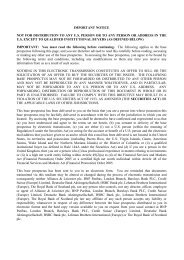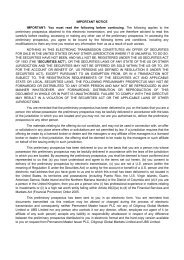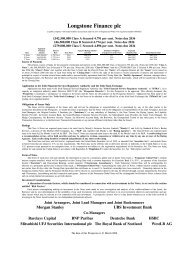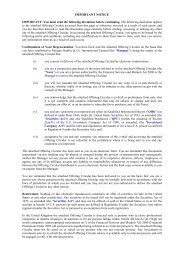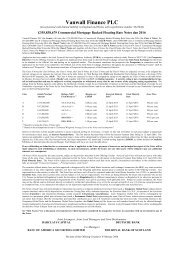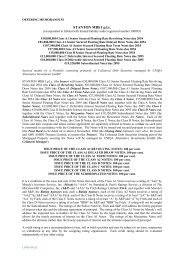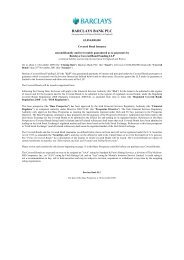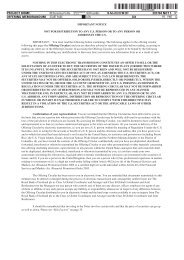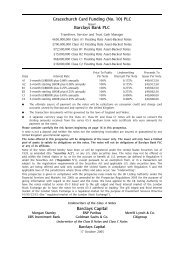Offering Circular. - SFM
Offering Circular. - SFM
Offering Circular. - SFM
Create successful ePaper yourself
Turn your PDF publications into a flip-book with our unique Google optimized e-Paper software.
Suitability<br />
Structured securities, such as the Notes, are sophisticated instruments, which can involve a significant degree<br />
of risk. Prospective investors in Notes should ensure that they understand the nature of the Notes and the<br />
extent of their exposure to the relevant risk. Such prospective investors should also ensure that they have<br />
sufficient knowledge, experience and access to professional advice to make their own legal, tax, accounting<br />
and financial evaluation of the merits and risks of investment in the Notes and that they consider the<br />
suitability of the Notes as an investment in light of their own circumstances and financial condition.<br />
Liability under the Notes<br />
The Notes will be limited recourse obligations solely of the Issuer and will not be the responsibility of, or<br />
be guaranteed by, any other entity. In particular, the Notes will not be obligations or responsibilities of, or be<br />
guaranteed by, the Corporate Services Provider, the Stichtingen Corporate Services Provider, the<br />
Representative of the Noteholders, the Computation Agent, the Italian Paying Agent, the Account Bank, the<br />
Agent Bank, the Servicer, the Luxembourg Paying Agent, the Luxembourg Listing Agent, the Originator, the<br />
Financing Party, the Joint Lead Managers or the quotaholders of the Issuer or any other person. None of such<br />
persons accepts any liability whatsoever in respect of any failure by the Issuer to make any payment of any<br />
amount due on the Notes.<br />
Relationship between Noteholders and the Other Issuer Creditors<br />
Under Condition 10 (Events of Default), the Representative of the Noteholders is not obliged to serve to the<br />
Issuer an Issuer Acceleration Notice declaring the Notes to be due and payable, unless it is directed to do so<br />
either:<br />
(a)<br />
(b)<br />
in writing by the holders of at least 75 per cent. of the Principal Amount Outstanding of the Notes; or<br />
by an Extraordinary Resolution of the holders of the Notes,<br />
and in addition, in each case, provided that it is indemnified and/or secured to its satisfaction against all<br />
liabilities and all costs and expenses (provided that supporting documents are delivered) which it may incur<br />
in so doing. In addition, following an Event of Default pursuant to Condition 10(a)(ii) (Breach of other<br />
obligations), the Representative of the Noteholders must certify to the Issuer that the occurrence of such<br />
event is in its opinion materially prejudicial to the interests of the Noteholders.<br />
Claims of creditors of the Issuer<br />
Without prejudice to the right of the Representative of the Noteholders to enforce the Note Security, the<br />
Conditions contain provisions stating, and each of the Other Issuer Creditors have undertaken pursuant to the<br />
Intercreditor Agreement, that no Noteholder or Other Issuer Creditor will petition or begin proceedings for<br />
a declaration of insolvency against the Issuer until one year and one day after the earlier of (a) the<br />
Cancellation Date and (b) the day on which the Notes have been paid in full. There can be no assurance that<br />
each and every Noteholder and Other Issuer Creditor will honour its contractual obligation not to petition or<br />
begin proceedings for a declaration of insolvency against the Issuer also before one year has elapsed from<br />
full repayment of the Notes. In addition, under Italian law, any other creditor of the Issuer would be able to<br />
begin insolvency or winding-up proceedings against the Issuer in respect of any unpaid debt. Such creditors<br />
could arise, for example, by virtue of unexpected expenses owed to third parties including those additional<br />
creditors that the Issuer will have as a result of any Further Securitisation (as defined below). In order to<br />
address this risk, the Priority of Payments contains provision for the payment of amounts to third parties.<br />
Similarly, monies to the credit of the Expense Account and of the Expenses Reserve Account may be used<br />
for the purpose of paying the ongoing fees, costs, expenses, liabilities and taxes of the Issuer to third parties<br />
not being Other Issuer Creditors.<br />
The Issuer is unlikely to have a large number of creditors unrelated to this Securitisation or any other<br />
securitisation transaction because the corporate object of the Issuer as contained in its by-laws (statuto) is<br />
limited and the Issuer has provided certain covenants in the Intercreditor Agreement which contain<br />
22



